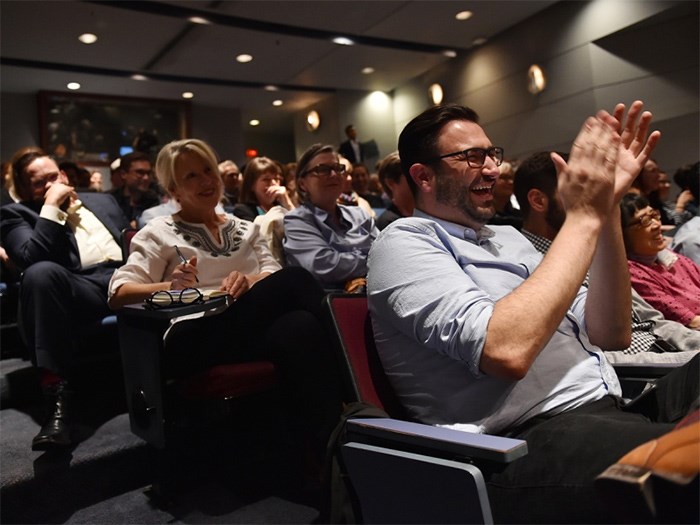 mayors debate The audience reacts during the, at times, lively debate at the first mayoral candidatesâ forum Monday night hosted by Business in Vancouver, Â鶹´«Ã½Ó³»is Awesome and the Courier. Photo Dan Toulgoet
mayors debate The audience reacts during the, at times, lively debate at the first mayoral candidatesâ forum Monday night hosted by Business in Vancouver, Â鶹´«Ã½Ó³»is Awesome and the Courier. Photo Dan Toulgoet
The Courier, Business in Â鶹´«Ã½Ó³»and Â鶹´«Ã½Ó³»is Awesome co-hosted the first mayoral debate of the election campaign Monday night. Hereâs what eight of the candidates had to say on a myriad of issues.
Due to the format of the debate, all of the candidates were not asked the same questions.
When asked about what they would do to help renters in the city, YES Vancouverâs Hector Bremner said that his new party would implement a three-year action to approve 50,000 to 70,000 more rental units for âthose that need itâ and aim to âprioritize and cut the red tapeâ and cut the community amenity contributions that, he said, have triggered many rentals to be turned into condos.
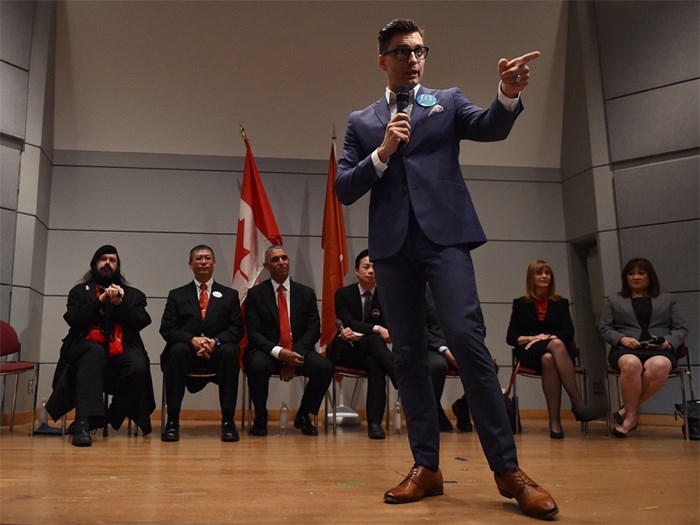 mayors debate YES Vancouverâs Hector Bremner makes a point Monday night during the mayoral debate co-hosted by Business in Vancouver, Â鶹´«Ã½Ó³»is Awesome and the Courier. Photo Dan Toulgoet
mayors debate YES Vancouverâs Hector Bremner makes a point Monday night during the mayoral debate co-hosted by Business in Vancouver, Â鶹´«Ã½Ó³»is Awesome and the Courier. Photo Dan Toulgoet
Independent candidate Kennedy Stewart said he would commit to creating 85,000 new housing units in the city over the next 10 years, 60 per cent for renters and 25,000 units at below market rental rates. He also said that in the meantime he would bring in a rentersâ advocate.
âWeâve got to look after current renters,â he said.
Fred Harding, with Â鶹´«Ã½Ó³»1st, also targeted the cityâs community amenity contributions (CACs), which are in-kind or cash contributions developers must pay when the city grants a rezoning permit.
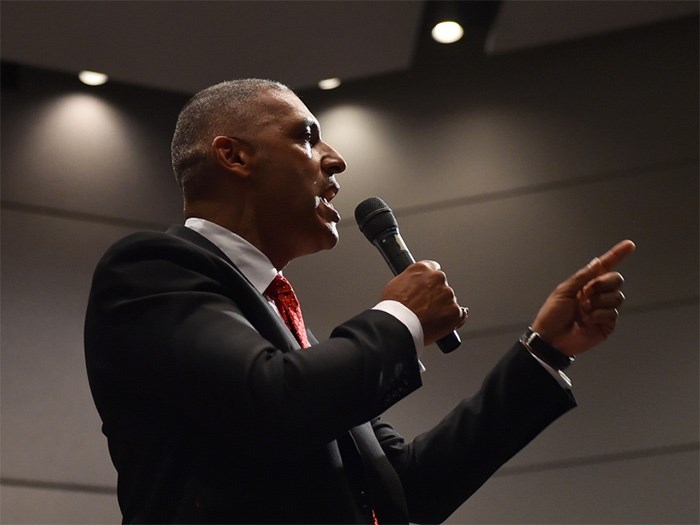 Â鶹´«Ã½Ó³»1st candidate Fred Harding also making a point. Photo Dan Toulgoet
Â鶹´«Ã½Ó³»1st candidate Fred Harding also making a point. Photo Dan Toulgoet
Harding gave the example of one case where a developer had to pay $43 million in CACs.
âThat gets passed on to rent,â he said. âItâs not sustainable. Itâs untenable and we really have to do something about CACs.â
He said the party would reduce, if not eradicate, CACs.
In talking about what types of housing should be allowed in the cityâs single-family neighbourhoods, Non-Partisan Association candidate Ken Sim criticized the current Vision Â鶹´«Ã½Ó³»council for âtrying to ram something through that will fundamentally change how our city looksâ â a public hearing is scheduled for Tuesday that will determine whether duplexes will be permitted in most single-family neighbourhoods, with staff looking at the possibility of allowing triplexes, fourplexes and four-storey apartments in low density neighbourhoods.
Sim said there needs to be a city-wide plan and promised consultation with all residents.
Independent candidate Shauna Sylvester said the policy is coming âvery, very lateâ and it fails to provide an affordable mechanism for upzoning.
âThatâs the problem.â
ProVancouverâs David Chen said the party has always advocated for a city-wide plan.
âYou canât just open up the streets to development without a plan.â
On the issue of bikes lanes, Coalition Â鶹´«Ã½Ó³»candidate Wai Young, more than once, reiterated her campaign promise to tear out the new 10thAvenue bike lane by Â鶹´«Ã½Ó³»General Hospital and on the Cambie bridge, as well as stop the proposed separated bike lane through Kits Beach park and audit the rest of the bike lanes in the city.
âSome of them just donât make sense,â she said.
Independent candidate Golok Buday said the issue is how the bike lanes are paid for and planned.
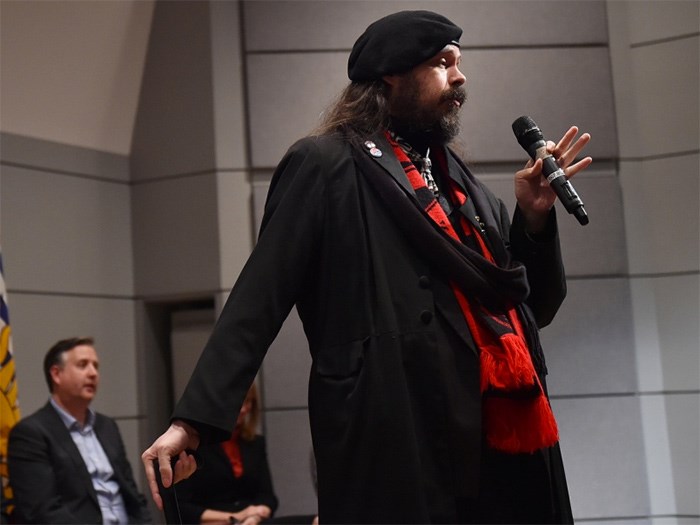 mayors debate Independent candidate Golok Buday. Photo Dan Toulgoet
mayors debate Independent candidate Golok Buday. Photo Dan Toulgoet
When asked how they would tackle the issue of homelessness in the city, Sim said he would âcamp out in Victoria and Ottawa to get funding from our partners in government⦠Itâs going to be hard but we need someone to champion it and actually take a stand and have political courage.â
Bremner said the city needs more âno barrier housing and a lot of it now.â
Young said the city needs to lobby the province for more treatment programs, and also referenced the example of Portugalâs five-year strategy on ending homelessness.
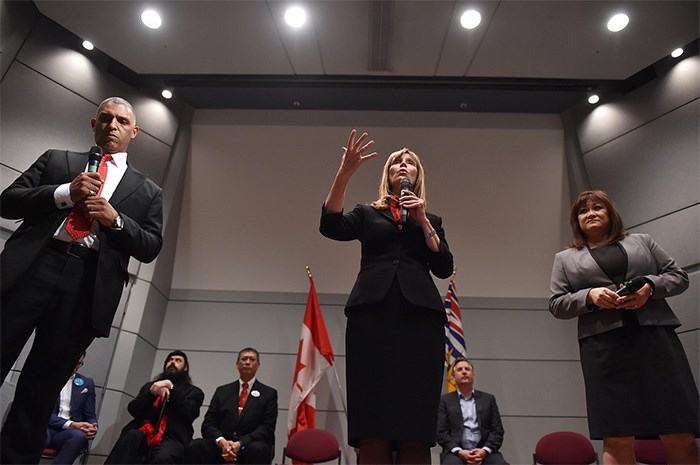 Independent candidate Shauna Sylvester (centre) has her say while Coalition Vancouverâs Wei Young (right) and Fred Harding of Â鶹´«Ã½Ó³»1st wait their turns. Photo Dan Toulgoet
Independent candidate Shauna Sylvester (centre) has her say while Coalition Vancouverâs Wei Young (right) and Fred Harding of Â鶹´«Ã½Ó³»1st wait their turns. Photo Dan Toulgoet
Chen took a hard line on the question of what to do about all of the unlicenced marijuana dispensaries in the city, saying that any dispensary that does not meet the cityâs regulations should be shut down. He also talked about taking fines a step further and turning them into tax leins.
âWe have to take a strong stance if weâre going to fix this problem.â
Harding agreed saying that dispensaries that do not qualify for a licence should close. He said the city needs âsome common sense around dispensariesâ and he has already engaged a local lawyer who is an expert on the matter.
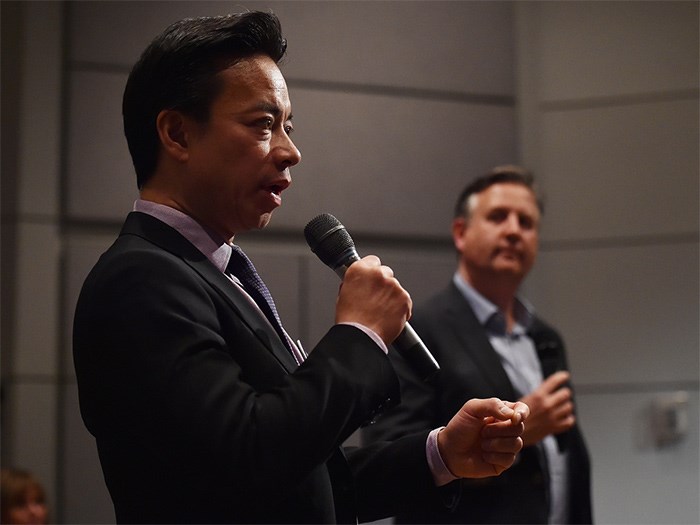 Independent candidate Kennedy Stewart looks on as the NPAâs Ken Sim answers a question. Photo Dan Toulgoet
Independent candidate Kennedy Stewart looks on as the NPAâs Ken Sim answers a question. Photo Dan Toulgoet
When asked how they would boost the cityâs civic profile and combat Vancouverâs reputation as âNo Fun Cityâ, Sim said itâs âcompletely ridiculousâ that people canât buy a beer or a bottle of wine in corner stores.
âAs mayor of Vancouver, weâll make that happen,â he said.
Stewart said that the city really needs affordable spaces for musicians and artists.
âWe need spaces for artists to create.â
For the full debate, check out the on Facebook.
@JessicaEKerr


